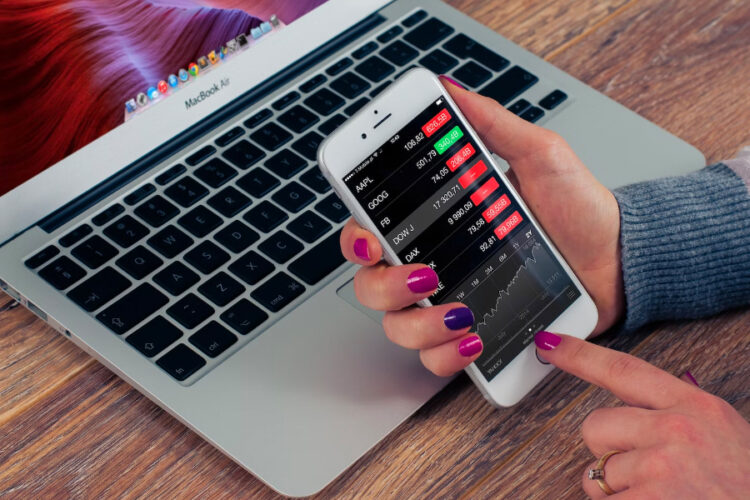In recent years, the world of trading has undergone a significant transformation with the advent of mobile technology. Mobile apps have revolutionized the way traders operate, providing them with the freedom and flexibility to trade anytime, anywhere. This paradigm shift has particularly influenced the trading landscape in India, where online trading apps and demat account apps have gained immense popularity and transformed the way investors participate in the market. In this blog, we will delve into the background of trading in India, explore the importance of mobile apps in modern trading, discuss the evolution and growth of mobile trading in India, highlight the advantages of trading apps, touch upon security and privacy concerns, present a case study of a successful trading app, and finally, explore future trends and opportunities.
Background on Trading in India:
India has a rich history of trading, with the stock market playing a crucial role in the economy. Traditionally, trading was conducted through physical exchanges or over the phone with the assistance of brokers. This method had limitations in terms of accessibility, speed, and convenience. Investors had to rely heavily on intermediaries and were bound by the constraints of physical presence. However, the rapid advancement of technology, coupled with the proliferation of smartphones, has paved the way for a new era of trading in India.
Importance of Mobile Apps in Modern Trading:
Mobile apps have become an integral part of modern trading due to their convenience and accessibility. Online trading apps and demat account apps allow investors to monitor market movements, access real-time data, execute trades, and manage their portfolios with just a few taps on their smartphones. These apps offer a user-friendly interface, making it easier for even novice traders to navigate the complexities of the market. Additionally, they provide a wide range of analytical tools, charts, and indicators, empowering traders to make informed decisions on the go.
Evolution and Growth of Mobile Trading in India:
In recent years, mobile trade in India has grown remarkably. As smartphone penetration increased and internet connectivity improved, more and more people gained access to online trading apps and demat account apps. Several brokerage firms and financial institutions recognized the potential of mobile apps and introduced their own trading applications. This competition led to constant innovation, with companies striving to provide the best user experience and feature-rich platforms. Today, trading apps have become a standard offering from most brokers, allowing traders to access multiple exchanges and trade in various financial instruments, including stocks, commodities, derivatives, and mutual funds.
Advantages of Trading Apps in India:
Trading apps offer several advantages over traditional trading methods in India. Firstly, they provide a cost-effective alternative to traditional brokerage services. With lower transaction costs, reduced paperwork, and the ability to trade in smaller quantities, trading apps have made trading more accessible to a wider range of investors.
Additionally, these apps address security and privacy concerns by implementing robust security measures. Features such as two-factor authentication, biometric login, and encrypted communication ensure that investors’ financial information and transactions are secure. Moreover, regulatory bodies in India, such as the Securities and Exchange Board of India (SEBI), have established stringent guidelines and protocols to ensure the safety of investors using trading apps.
Case Study: Enrich Money ORCA Trading App Success Story:
One successful example of a trading app in India is the Enrich Money ORCA app. Enrich Money, a renowned brokerage firm, introduced the ORCA app, which quickly gained traction among traders. The app provides a seamless trading experience with features like real-time market data, advanced charting tools, and quick order execution. Enrich Money ORCA app offers a wide range of financial instruments, including equities, commodities, and currency derivatives. Its user-friendly interface and intuitive design have garnered positive feedback from traders, making it a preferred choice among investors.
Future Trends and Opportunities:
The future of trading apps in India looks promising, with several trends and opportunities on the horizon. As technology continues to advance, we can expect more sophisticated trading apps with enhanced features like artificial intelligence-based trading bots, personalized recommendations, and social trading capabilities. Furthermore, the integration of blockchain technology may revolutionize the settlement process, making it faster and more secure. Additionally, the rise of decentralized finance (DeFi) and cryptocurrency trading presents new avenues for trading apps to explore.
Conclusion:
Mobile apps, including online trading apps and demat account apps, have transformed the trading landscape in India, empowering traders to participate in the market anytime, anywhere. They provide convenience, accessibility, and a wide range of features that make trading easier and more efficient. With the continuous evolution of technology, trading apps are expected to play an even more significant role in the future. As traders embrace these powerful tools, they can navigate the complexities of the market with confidence, seize opportunities, and achieve their financial goals.

